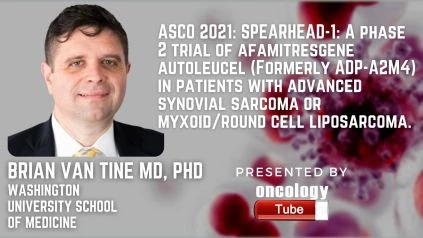Brian Van Tine, MD, Ph.D., associate professor of medical oncology, Washington University School of Medicine speaks about the ASCO 2021 Abstract – SPEARHEAD-1: A phase 2 trial of afamitresgene autoleucel (Formerly ADP-A2M4) in patients with advanced synovial sarcoma or myxoid/round cell liposarcoma.
Link to Abstract:
https://meetinglibrary.asco.org/record/195713/abstract
Backstory:
SPEARHEAD-1 (NCT04044768) is a phase 2 open-label experiment that will assess the effectiveness, safety, and tolerability of afamitresgene autoleucel in 45 patients with advanced/metastatic synovial sarcoma or Myxoid/Round Cell Liposarcoma (MRCLS).
Methodologies:
HLA-A*02 positive patients with MAGE-A4-expressing malignancies are eligible. Pts are given leukapheresis to harvest autologous T-cells, which are then processed and turned into afamitresgene autoleucel cells. After receiving lymphodepleting chemotherapy, patients were given afamitresgene autoleucel dosages ranging from 1–10 109 transduced T-cells. The total response rate per RECIST v1.1 by independent review is the key objective. During the interventional phase, an independent Data Safety Monitoring Board examines ongoing safety and benefit: risk.
Outcomes:
Afamitresgene autoleucel was given 32 points as of February 4, 2021. These patients were 59 percent male, 87.5 percent had synovial sarcoma, had a median age of 43 years (range: 24–73), and had had three previous systemic therapies. The transduced cell dosage varied from 2.7–9.9 x 109, while the MAGE-A4 antigen expression level (histoscore) ranged from 112–300. At the data cutoff, 25 points (23 with synovial sarcoma and 2 with MRCLS) were evaluable for preliminary effectiveness, whereas 7 points (5 with synovial sarcoma and 2 with MRCLS) had insufficient follow-up (8 weeks follow-up and/or awaiting first scan). Complete response (2 pts), partial response (8 pts), stable illness (11 pts), and progressing disease (25 pts) were the investigator-assessed responses (4 pts). All of the replies were verified. At the data cutoff, nine of the ten responders had a continuing reaction, and three of them had MAGE-A4 antigen histoscores of less than 200. Neutropenia, lymphopenia, nausea, cytokine release syndrome, leukopenia, tiredness, pyrexia, and anemia were the most prevalent AEs of any severity (>30 percent of patients). Cytokine release syndrome of any grade occurred in 19/32 participants, with Grade 2 episodes accounting for 95% of the total. So far, no cases of immunological effector cell-associated neurotoxicity syndrome (ICANS) have been documented. Six patients had cytopenia (G3) four weeks after the injection (anemia 3 pts, neutropenia 2 pts, and thrombocytopenia 1 pt).
Conclude:
These early findings show that afamitresgene autoleucel is effective and well-tolerated in patients who have been severely pre-treated. Objective responses have been found over a wide range of MAGE-A4 antigen levels, as well as deep responses. The initial statistics on durability are promising. SPEARHEAD-1’s preliminary response data is comparable to the results of a previous Phase 1 study [1]. Afamitresgene autoleucel has a good safety record thus far, with mostly low-grade cytokine release syndrome and tolerable/reversible hematologic effects. [1]. CTOS; November 18-21, 2020; Virtual; Van Tine BA, et al.
Clinical trial information: NCT04044768
http://clinicaltrials.gov/show/NCT04044768

